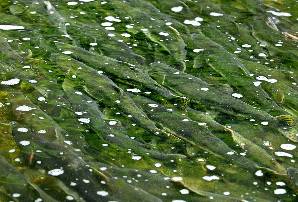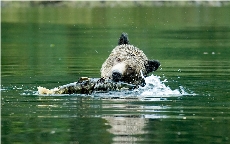
Last week fisheries biologist, Otto Langer, went public with a leaked draft of proposed amendments to the federal Fisheries Act which would remove any mention of fish habitat from the Act. When asked about these rumours in Parliament the government seemed to confirm that changes along these lines have not been ruled out, although in a statement on Friday Fisheries and Oceans Canada emphasized that no final decision has been made.
We don’t know the truth of these reports. Indeed, the proposed amendments are so outrageous that one might ask whether they are a “straw man” – an idea set up to be knocked down. Could this proposed amendment have been leaked so that when abandoned the government can appear that much more reasonable and balanced if and when it guts the Canadian Environmental Assessment Act, the Species At Risk Act and other environmental laws?
 We’re concerned about proposed amendments weakening a range of Canadian environmental laws, all of which are extremely important, but the amendments can be complicated. But the proposed Fisheries Act amendment, if real, is easy to understand: removing legal protection for fish habitat will harm fish. And, in BC at least, that will harm what is an iconic species – the salmon.
We’re concerned about proposed amendments weakening a range of Canadian environmental laws, all of which are extremely important, but the amendments can be complicated. But the proposed Fisheries Act amendment, if real, is easy to understand: removing legal protection for fish habitat will harm fish. And, in BC at least, that will harm what is an iconic species – the salmon.
Appreciation for the salmon, and concern about its habitat, cuts across the supporters of all political parties. These proposed amendments to the Fisheries Act are about allowing business interests to destroy fish habitat and will be very difficult for the government to sell to Canadians.
What are the amendments?
Langer reports that he’s been told that the 2012 Budget Bill (which we understand will be announced March 29th) will contain amendments to section 35 of the Fisheries Act. Section 35 in essence says that it is illegal to harmfully alter fish habitat without approval from Fisheries and Oceans Canada (DFO). According to Langer, the new version of this section will read (in part):
No person shall carry on any work, undertaking or activity, other than fishing, that results in an adverse effect on a fish of economic, cultural or ecological value.
Which sounds good – who can be against protecting fish – until you realise that, unlike the current wording in the Act, there is no mention of habitat, and that it eliminates protection of fish that aren’t deemed to have enough economic, cultural or ecological value – however that’s going to be determined.
As Linda Nowlan at the World Wildlife Fund explains:
The prohibition on destruction of fish habitat is a key tool for regulators responsible for protecting the environment. When a mining company wants to turn a sacred lake into a tailings pond in BC, what law prevents that from occurring? The Fisheries Act. When the effects of a new dam will harm fish, what law is invoked? The Fisheries Act. When a developer fills in a stream, what law can be used to lay charges? Again, the Fisheries Act.
The amendments have every appearance of being done to smooth the road for industrial operations that destroy or harm fish habitat.
What do Salmon mean to British Columbians?
I would think that these changes will be shocking and controversial across Canada. But there is reason to believe that British Columbians will be particularly opposed to these amendments, and that opposition to the elimination of Fish Habitat crosses party lines.
In 2011 a poll conducted for Watershed Watch Salmon Society and Skeena Wild Conservation Trust found that British Columbians felt that Salmon are as culturally significant to British Columbians as the French language is to Quebecers. The Globe and Mail reported:
“The response to that question shows how strongly people identify with wild salmon in this province,” said Craig Orr, executive director of Watershed Watch Salmon Society, which funded the poll with Skeena Wild Conservation Trust. “The salmon resource is not a trivial thing in British Columbia. It’s engrained in our culture and in our economy.” …
“It’s obvious that people value wild salmon pretty highly,” he said. “People think government has to do a better job and they want to protect what we’ve got, even if it costs more in terms of forgoing development or paying higher taxes.”
Asked specifically about the value of fish habitat, an average 86% of respondents agreed (and 50% strongly agreed) that: “Economic growth and development should not come at the expense of wild salmon habitat.” This ranged from a low of 84% of voters who had voted Conservative in the last federal election to a high of 92% who had voted Green – an astounding level of agreement.
 84% of respondents said that they were concerned about the impact of habitat destruction on salmon runs – similar to the levels of concern about pollution and overfishing, and much higher than public concern about the impacts of fish farms or climate change on salmon populations. Again, this polled high across party lines.
84% of respondents said that they were concerned about the impact of habitat destruction on salmon runs – similar to the levels of concern about pollution and overfishing, and much higher than public concern about the impacts of fish farms or climate change on salmon populations. Again, this polled high across party lines.
The 38,000 member BC Wildlife Federation has already come out strongly against these proposed amendments, writing to the Prime Minister that:
Our members are passionate advocates for fish and wildlife and the sustainability of their habitats. Over the years BCWF volunteer members, though broad-based community stewardship partnerships across BC, have invested heavily in stream, river and lake fisheries habitat rehabilitation projects and have a stake in the protection of that substantial stewardship investment.
The alteration of the provisions of Section 35 of the federal Fisheries Act would be a major step backward for these resources.
Clearly British Columbians will be skeptical of changes to the Fisheries Act – such as those being discussed – that put salmon habitat at risk.
So what to do?
If you’re concerned about the proposed amendments to the Fisheries Act, now’s the time to let your MP, and the federal government know.
But let’s not lose sight of the fact that this attack on salmon and other fish species is part of a broader attack on Canada’s environmental laws generally. Go to envirolawsmatter.ca, and find out how you can help.

Photos courtesy of Andrew S. Wright / www.cold-coast.com